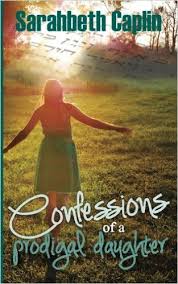 In a short and fast-paced read, blogger-and-author Sarahbeth Caplin does us a favor in producing a book which simultaneously tells a story while challenging modern evangelicalism in some of its ugliest . Having both moments of “deepness” as well as lightheartedness, I would recommend Confessions of a Prodigal Daughter, a light and energetic read, for the following reasons.
In a short and fast-paced read, blogger-and-author Sarahbeth Caplin does us a favor in producing a book which simultaneously tells a story while challenging modern evangelicalism in some of its ugliest . Having both moments of “deepness” as well as lightheartedness, I would recommend Confessions of a Prodigal Daughter, a light and energetic read, for the following reasons.
A call to (re)think
Though in some areas I may be on a different track theologically than Caplin, I find those moments when she challenges modern Christianity to be refreshing as her objections certainly have merits. I feel that when we try to de-Jew the Bible we may actually be popping a vein of Scripture. When we make Christianity to be wholly Western we are doing an injustice to the New (and Old) Testament. In a critique of modern (American?) Christianity she writes the following words:
“Jews, who are no strangers to suffering, don’t overly theologize pain. … It’s okay to not have answers. Sometimes emphasizing, not theologizing, is the most Christ-like response” (p. 108).
Of course there are Christians, as I’m confident Caplin is aware of, who already have this principle figured out. And yet it is still not uncommon to hear such phrases as “God is in control” or the dreaded “they’re in a better place” spoken to those who are mourning when in fact they may just need a shoulder to cry on.
Confessions of a Prodigal Daughter is ultimately a call to think and think hard about what it actually means to be a Christian. For that reason alone I would recommend this book.
A call to understand privilege
What I mean by this is that so many Christians in the West were born into Christian families and thus we will never experience that fear and dread that some individuals feel when they “come out” as Christians, be it to families that are atheist or, as is Caplin’s case, families and friends who are Jewish. Here’s an excerpt in which she recounts a friend’s experience when he became a Christian:
“One…friend told me how his mother, an atheist, flat-out told him she didn’t love him anymore after he became a Christian” (p. 57).
This really shook me since I really haven’t ever faced persecution. Rather my parents hoped and prayed for me that I would personally walk with Christ. I haven’t experienced the fear of “coming out” to my family about being a Christian as Caplin and others have. I have no experience of that, being from a Christian culture that wishes their children would follow Jesus, honoring (rather than shaming) when this does happen. I have never been treated hostile by my family for my religion (except mildly from a family member who is an atheist). In that sense I am privileged.
A great and accessible format
Though Caplin proves to be a skillful writer, she does not write from the clouds but has a down-to-earth style that won’t allow what she writes to go over the reader’s head. Though utilizing humor at times, she is not afraid to delve into the messiness of Christian life. Dealing with a transition from one faith to another, Confessions of a Prodigal Daughter accomplishes much in just a few pages, proving to be unique.

Concluding Thoughts
If you are a Christian who is “faint at heart” you may not like Caplin’s occasional use of profanity (I personally didn’t care) or her candidness at moments. I appreciated her frankness about topics that may at times be candy-coated or explained away swiftly in Christianity. As already noted, this book makes you think, and it’s a good thing for Christians to never stop thinking.
Thanks, Sarabeth, for providing me with a copy! I’ll pass this along!

February 25, 2017 at 1:35 pm
I love to hear stories of Jewish Believers.
LikeLiked by 1 person
February 26, 2017 at 3:44 am
I as well! Stay tuned as I will have an interview up with this author soon regarding her faith and jouney and the parallels (and differences!) between Christianity and Judaism.
LikeLiked by 1 person